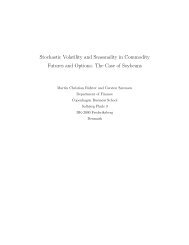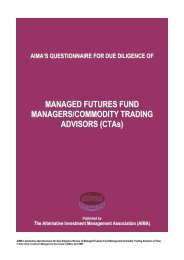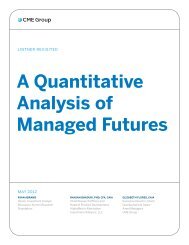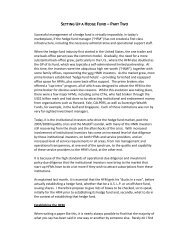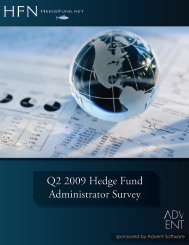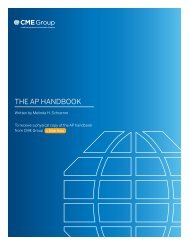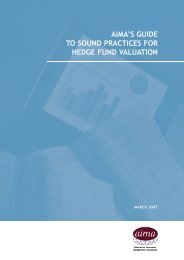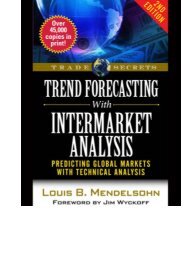Chicago Board of Trade - Interconti, Limited
Chicago Board of Trade - Interconti, Limited
Chicago Board of Trade - Interconti, Limited
Create successful ePaper yourself
Turn your PDF publications into a flip-book with our unique Google optimized e-Paper software.
The disciplined use <strong>of</strong> leverage enables traders to<br />
control large dollar amounts in the futures markets<br />
with a comparatively small amount <strong>of</strong> capital. To<br />
ensure performance <strong>of</strong> the terms <strong>of</strong> the futures<br />
contract, both the buyer and seller are required to<br />
deposit a performance bond margin in an account<br />
at their brokerage firms. (Note that in the futures<br />
industry, the term margin represents a security<br />
deposit, whereas in the stock market, margin<br />
represents a down payment.) The amount <strong>of</strong><br />
daily maintenance margin required by brokerage<br />
firms fluctuates with the daily value <strong>of</strong> the<br />
futures position.<br />
Types <strong>of</strong> Investment Opportunities<br />
According to the Barclay Trading Group, Ltd.<br />
in 2004, it was estimated that over $130 billion<br />
was under management by futures trading<br />
advisors worldwide. Currently, there are three<br />
primary categories <strong>of</strong> managed futures.<br />
Individual Accounts are usually opened by<br />
institutional investors or high net worth<br />
individuals. These funds usually require a<br />
substantial capital investment so that the advisor<br />
can diversify trading among a variety <strong>of</strong> market<br />
positions. An individual account enables<br />
institutional investors to customize accounts to<br />
their specifications. For example, certain markets<br />
may be emphasized or excluded. Contract terms<br />
may include specific termination language and<br />
financial management requirements.<br />
Private Pools commingle money from several<br />
investors, usually into a limited partnership. Most<br />
<strong>of</strong> these pools have minimum investments ranging<br />
from approximately $25,000 to $250,000.<br />
These futures partnerships usually allow for<br />
admission-redemption on a monthly or quarterly<br />
basis. The main advantage <strong>of</strong> private pools is<br />
the economy <strong>of</strong> scale that can be achieved for<br />
middle-sized investors. A pool also may be<br />
structured with multiple trading advisors with<br />
different trading approaches, providing the investor<br />
with maximum diversification. Because <strong>of</strong> lower<br />
administrative and marketing costs, private<br />
pools have historically performed better than<br />
public funds.<br />
Public Funds or Pools provide a way for small<br />
investors to participate in an investment vehicle<br />
usually reserved for large investors.<br />
Participants in the Managed<br />
Futures Industry<br />
There are several types <strong>of</strong> industry participants<br />
qualified to assist interested investors. Keep in<br />
mind that any <strong>of</strong> these participants may, and <strong>of</strong>ten<br />
do, act in more than one capacity.<br />
Commodity Trading Advisors (CTAs) are<br />
responsible for the actual trading <strong>of</strong> managed<br />
accounts. There are approximately 800 CTAs<br />
registered with the National Futures Association<br />
(NFA), which is the self-regulatory organization for<br />
futures and options markets. The two major types<br />
<strong>of</strong> advisors are technical traders and fundamental<br />
traders. Technical traders may use computer<br />
s<strong>of</strong>tware programs to follow pricing trends and<br />
6


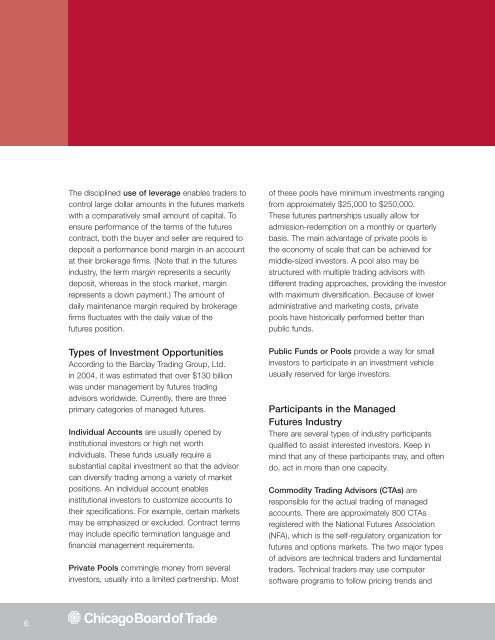
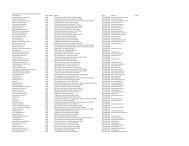
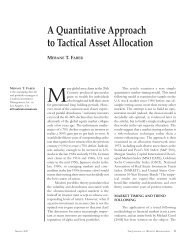
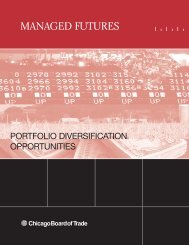
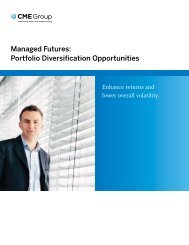
![Definitions & Concepts... [PDF] - Cycles Research Institute](https://img.yumpu.com/26387731/1/190x245/definitions-concepts-pdf-cycles-research-institute.jpg?quality=85)
